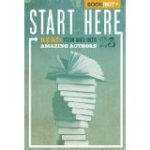My children have played violin and cello for years using the Suzuki method. A hallmark of the Suzuki method of music instruction is achieving good tone, a high quality sound. Such tone makes the difference between the musician sounding like a beginner or a seasoned player. Good tone can also make the difference between the audience liking or disliking stringed instruments altogether. There is a certain bit of you’ll- know- it- when- you-hear-it with regards to musical tone, just as there is a broad and deep subjective measure of a good tone in speaking and writing. Good tone ultimately makes or breaks your audience, and judgment is swift and uncompromising.
So when I picked up Start Here, a self-proclaimed field guide to finding quality literature to read, my inclination was to judge on tone. This unsophisticated attempt to provide a literary beginning for the unread, surprisingly, has tone as its most profound strength. Having heard Joshua Bell play Yankee Doodle in concert, I can tell you, good tone trumps sophistication in any piece, and Start Here is no exception. This is not your older sibling rolling her eyes at your lack of knowledge, nor is it your name-dropping colleague who condescends to speak to you. Start Here speaks like your favorite teacher, full of knowledge and convenient office hours. This accessible voice persists despite the three-time use of the literary inner circle word: oeuvre.
The authors of Start Here collectively address what I have found frustrating in tapping the works of alleged “good” authors. Not all critically acclaimed writers produce fantastic works every time. Sometimes they crap a novel. Rachel Manwill of Book Riot describes some of John Irving’s more recent writings as “clunkers.” Amanda Nelson, also of Book Riot, suggests to read the widely known novels by Charles Dickens but avoid his minor works “unless you’re a completist.” Author of The Night Circus, Erin Morgenstern, steers the gentle reader away from Neil Gaiman’s Sandman. These are genuinely helpful nuggets of advice. Furthermore, the authors openly admit they are not writing to provide an exhaustive review of all literature; rather, they aim to provide friendly suggestions. With that disclaimer, I can confidently declare: Mission Accomplished.
While Cassandra Neace did not convince me to read anything by Gabriel Garcia Marquez, surprisingly, she did succeed in causing me to take a second pass at Ray Bradbury, an author I’ve neglected for decades. My science fiction conversion continued with Steve Randolph’s emphasis on the philosophy of Phillip K. Dick’s works and the declaration that there is a “right science-fiction.” I will probably tackle Italo Calvino at the end of my sci-fi journey, a sort of working my way up the sci-fi ladder, but his If On a Winter’s Night A Traveler and Invisible Cities (perhaps Cosmicomics) are definitely in my queue. Start Here has convinced me, not through argument, but perhaps the exact opposite, “Hey, we liked this, perhaps you’d like it, too.”
Start Here
Jeff O’Neal and Rebecca Joines Schinsky, Editors
Book Riot
2012

